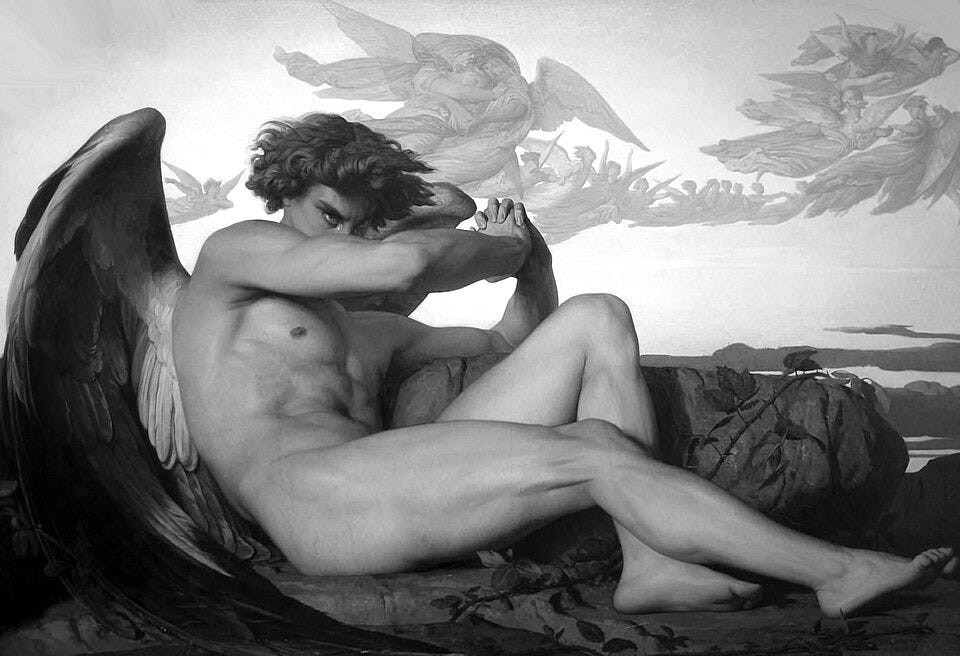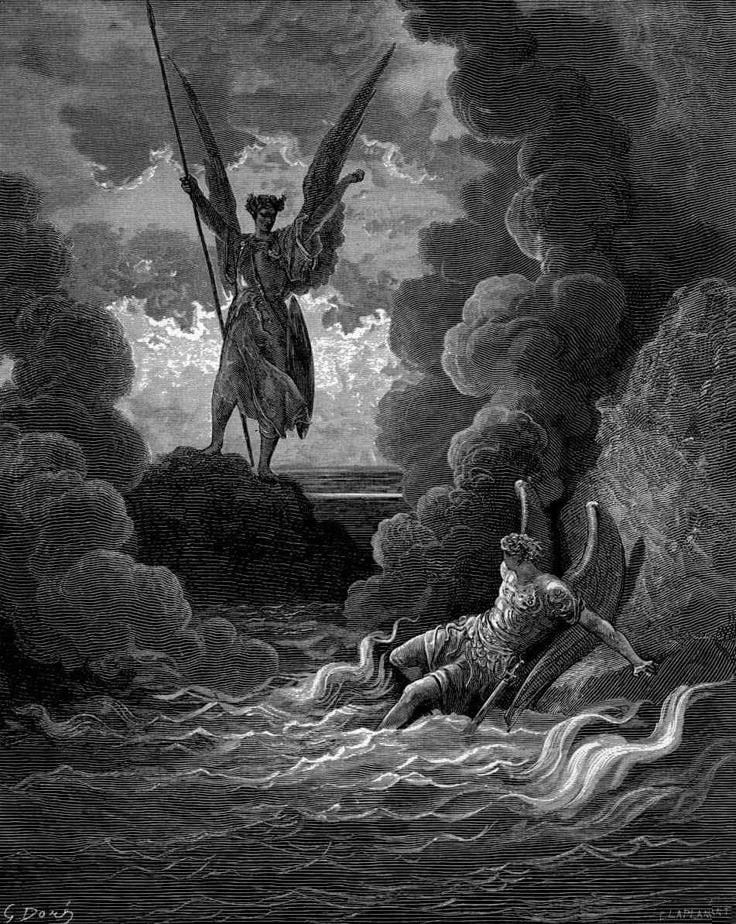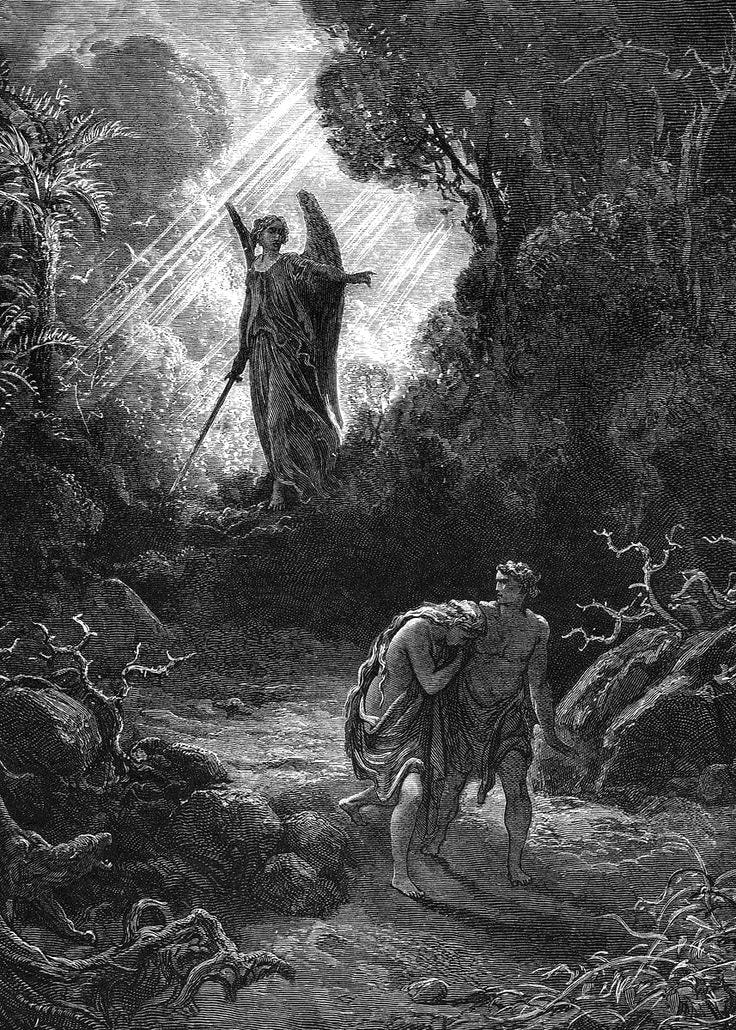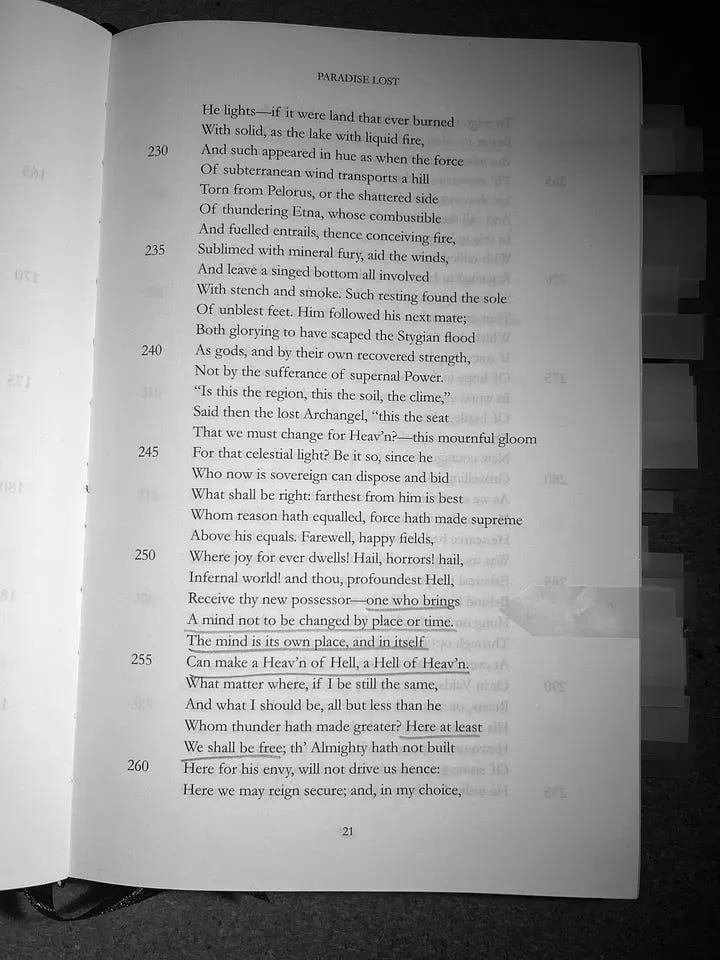Wrath and the Two Falls, of Satan and Man
Paradise Lost by John Milton
Note: Before you step into these reflections, I want to clarify something: what follows is not theological or criticism of religious beliefs. I do not write to challenge any faith or to pass judgment on religion. This is purely a literary and philosophical reflection on John Milton's Paradise Lost. Especially the questions and ideas that asked to be written down.
Dear Reader,
There is no definite right and wrong, and everything is perspective and relative. I have always considered Satan as an anti-hero, rather than a villain. For a fair bit of sense, I have not always seen him as the evil incarnation, but someone who wanted something for himself, who opposed or rejected what was laid before him instead of following blindly.
To prove that you are worthy of something if you are not content with it → that does not seem evil-ish to me. In his case, it was the envy of God’s supremacy, the hunger for power. So in the rebellion he started, I always considered him an anti-hero, not a mere villain.
If raising a voice and taking action against something you do not believe in is wrong, then I would not call it evil. Satan believed he was being wronged. All he wanted was free will, and he tried to gain it through ambition and hunger for power.
I expected Paradise Lost to be simply an epic of angels and humans, but I found myself pondering three questions throughout my reading, particularly around the two falls at its heart:
Satan’s Wrath: Was it more intense before or after his fall? And how did it transform?
Fall of Satan vs. Fall of Man: Which has more devastating consequences?
The Sin: What’s truly dooms us? Satan’s rebellion or mankind’s hunger for knowledge?
Satan’s Wrath
Before the fall, Satan’s wrath was a mix of ambition, envy, and pride. It felt purely energetic, even nobly rebellious. That he still had something to win. The anger in him had dignity, which was almost heroic.
“Better to reign in Hell than serve in Heaven”
But after the fall, the wrath somehow shifted. He cannot win, and yet he will not repent. It is no longer only rebellion but it became utter bitterness and hatred, where he wanted to drag others down with him.
“Which way I fly is Hell; myself am Hell”
He came to a realization that he can no longer achieve ambition, free will, or glory for himself, so he corrupted and waged a silent war on what God loves the most, humanity.
Ironically, I think in corrupting man, he achieved what he had longed for. He gave humanity free will. And he has got it too, the freedom and free will. But in the form of Hell.
It is like the famous saying goes, “What defines us is not that we fall, but what we do after the fall”.
“So farewell hope, and with hope farewell fear, Farewell remorse; all good to me is lost”
Fall of Satan vs. Fall of Man
Satan’s fall, which Milton describes as a grand rebellion, majorly lost him heaven forever, but the consequences are limited to himself and his followers, dragging down a third of angels. However deadly or ruthless the rebellion was, it was still contained. His damnation is self-chosen, and in some twisted way, liberating too. His Hell becomes his own kingdom.
Man’s fall, however, is different. Milton describes it as a weakness and mostly consequential. It has a cascading effect across all generations and is universal for all humanity, where suffering and death entered the world. However, the good side of this is, it also introduced the possibility of redemption.
In Milton’s vision, he says this doom is not final.
“Greater Man restore us, and regain the blissful seat”
Even though Satan has achieved free will and freedom, it traps him in eternal wrath, a freedom that is really a prison (or does he not feel it as a prison, and doesn’t want or seek any redemption? That’s another good discussion to follow). Eternal damnation. But humanity, we still have one leg on both sides, choosing whether this possibility of freewill is a boon or bane! Damnation vs Hope.
The Sin
Which fall is more devastating?
For me, it is the Fall of Man.
I think, Fall of Satan, or the outcome was something he did not expect or fully grasp until it was too late. But it is still his alone. However dreadful or despair it led him to, he and his followers had achieved freedom and free-will through Hell, because he is unbound now.
But humanity, I would call it a doom consequence. Fall of Man carries the burden of that one moment forever and all of humanity has to bear it. And to prove worthy or obtain salvation, the only path is through redemption.
It is such a classic example of how choices of a few cascade into history for the coming generations. Like when they say, how the sins of parents pass into the lives of children.
Albeit, even here, I cannot agree if I must call Eve’s choice a sin. Her longing was for knowledge and wisdom beyond what was given to her. Can such desire be called greed or corruption? I would call it transformation. A step towards freedom, selfhood, and knowledge. An attempt to exceed our limits to be more, with an intention of obtaining good? But I do understand that it comes at a cost: pain, suffering, and death. And that too, for all of humanity.
What I liked about Paradise Lost is, Milton has not just shown me doom, but he taught me how to read doom. That every doom comes with a warning, devastating effect, and then an opportunity to hope.
Yours in thought,
Yana





